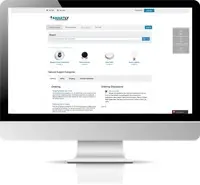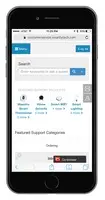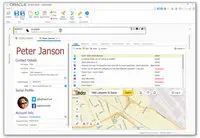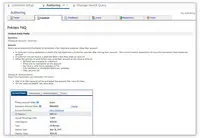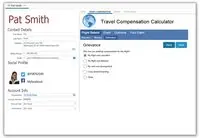Overview
What is Oracle Fusion Service?
Oracle Service Cloud is the help desk and customer experience management platform from Oracle. The technology was developed and supported by RightNow Technologies as RightNow CX for cloud-based call center automation, until that company's acquisition by Oracle in 2011 for…
Hybrid Oracle Blend
Great solution for Finance team to manage their day-to-day operations
Rocking
Why Oracle has to innovate
Great platform to manage Customers
Oracle Service Cloud Easy of Use!
Oracle Service - Provides 360 degree view
Not the right fit but good for others
A polyglot review of Oracle Service
Product with a lot to offer for CX-Service needs
Oracle Service is simple to use and configure.
Oracle Service review
We have used customized …
Love it and want more of it!
Powerful customer service systems and contact center apps
Awards
Products that are considered exceptional by their customers based on a variety of criteria win TrustRadius awards. Learn more about the types of TrustRadius awards to make the best purchase decision. More about TrustRadius Awards
Popular Features
- Ticket creation and submission (74)8.787%
- Ticket response (74)8.080%
- Email support (74)7.979%
- Internal knowledge base (74)7.777%
Reviewer Pros & Cons
Pricing
What is Oracle Fusion Service?
Oracle Service Cloud is the help desk and customer experience management platform from Oracle. The technology was developed and supported by RightNow Technologies as RightNow CX for cloud-based call center automation, until that company's acquisition by Oracle in 2011 for about $1.5 billion.
Entry-level set up fee?
- No setup fee
Offerings
- Free Trial
- Free/Freemium Version
- Premium Consulting/Integration Services
Would you like us to let the vendor know that you want pricing?
7 people also want pricing
Alternatives Pricing
What is Intercom?
Intercom creates modern Customer Service software that aims to redefine how businesses support their customers. The platform connects businesses directly to customers using powerful messaging and automation. According to the vendor, Intercom enables teams to scale support without investing more…
What is LiveAgent?
LiveAgent is a help desk software designed to help users bring personalization to customer interactions. LiveAgent presents an omnichannel universal inbox, real-time live chat, built-in call center, and a customer service portal. It offers customer segmentation, automation, built-in CRM, and an…
Product Demos
RightNow CTI Integration Demo
Doctor CX - Oracle Service Cloud - Dynamic Agent Desktop Demo
Features
Incident and problem management
Streamlining ticketing and service restoration processes
- 7.4Organize and prioritize service tickets(73) Ratings
Prioritize tickets to ensure most urgent are tackled first
- 7.5Expert directory(53) Ratings
Directory of IT and businesses services available to customers to help route tickets to appropriate subject matter experts
- 7.5Subscription-based notifications(57) Ratings
Users subscribe to notifications for ticket updates
- 6.7ITSM collaboration and documentation(50) Ratings
Issue resolution through collaboration mechanisms like discussion threads, social tools; agents can attach notes, files, etc. to tickets in order to maintain a record of all interactions related to the case.
- 8.7Ticket creation and submission(74) Ratings
Users and agents can easily enter new support requests.
- 8Ticket response(74) Ratings
Agents can easily follow up with customers.
Self Help Community
Features that allow customers to self-service for support issues.
- 6.9External knowledge base(65) Ratings
Customers can self-service by searching through help articles.
- 7.7Internal knowledge base(74) Ratings
Internal knowledge base helps agents answer customers' support questions.
Multi-Channel Help
Features related to providing customer service and support via different communication channels. Communications are organized by ticket/customer/channel for the convenience of agents.
- 7.5Customer portal(69) Ratings
Customer portal allows customers to submit tickets themselves and/or access self help resources.
- 7.6IVR(35) Ratings
Includes an interactive voice response system for routing callers to the correct agent or information.
- 4.8Social integration(46) Ratings
Agents can communicate with customers via social networks like Facebook and Twitter; may also include brand activity monitoring/reporting capabilities.
- 7.9Email support(74) Ratings
Integrates with email so that agents can send and receive information related to support tickets via email; email communications are attached to support tickets.
- 8.6Help Desk CRM integration(54) Ratings
Integrates with CRM so that tickets and support communications are coordinated with customers' records.
Product Details
- About
- Competitors
- Tech Details
- FAQs
What is Oracle Fusion Service?
Oracle Service (formerly Oracle Service Cloud), part of the Oracle Advertising and Customer Experience suite, is a cloud-based, omnichannel solution that delivers relevant, connected customer experiences via personalized service interactions with a 360-degree view of the customer. With both B2C and B2B offerings, Oracle Service empowers businesses to offer customers various choices to engage across channels—anywhere, and any time—while balancing automation and intelligence with high-value customer engagement. Oracle Service's approach is driven by knowledge, automation, and evolving customer engagement channels, simplifying every service experience for agents and customers alike. By helping to differentiate an organization’s service experience, Oracle Service aims to deliver measurable business impacts across all industries.
The platform includes: Digital Customer Service, Service Center, Field Service, Knowledge Management, Customer Data Management, and Intelligent Advisor.
Oracle Fusion Service Screenshots
Oracle Fusion Service Video
Oracle Fusion Service Competitors
Oracle Fusion Service Technical Details
| Deployment Types | Software as a Service (SaaS), Cloud, or Web-Based |
|---|---|
| Operating Systems | Unspecified |
| Mobile Application | Apple iOS, Android, Windows Phone, Blackberry, Mobile Web |
| Supported Languages | Arabic, Bulgarian, Chinese, Croatian, Czech, Danish, Dutch, English, Estonian, Finnish, French, German, Hungarian, Italian, Japanese, Korean, Latvian, Lithuanian, Greek, Norwegian, Polish, Portuguese, Romanian, Russian, Serbian, Slovenian, Spanish, Swedish, Turkish, Ukranian |
Frequently Asked Questions
Comparisons
Compare with
Reviews and Ratings
(237)Attribute Ratings
- 10Likelihood to Renew9 ratings
- 10Availability1 rating
- 9Performance1 rating
- 10Usability5 ratings
- 10Support Rating7 ratings
- 9In-Person Training1 rating
- 9Implementation Rating4 ratings
- 9Configurability1 rating
- 10Product Scalability1 rating
- 5.8Ease of integration11 ratings
- 6Oracle Implementation Satisfaction1 rating
Reviews
(1-5 of 5)A world-class customer engagement platform for all organizations.
- Its offers a social interaction platform that allows us to maintain contact and engagement within our various social media accounts and within our website.
- The process of adoption and deployment is instant and this ensures simplicity in its usage within our departments much to our benefit.
- Comes with self-service feature where our customers are able to obtain help and support on their own and this brings convenience and comfort to our clients.
- The pricing of the platform may not favor small users who may wish to expedite the usage of the platform in customer engagement.
- We have not had major challenges but a few of our staff had a steep learning curve in the initial stages of using the platform.
- Organize and prioritize service tickets
- 100%10.0
- Expert directory
- 100%10.0
- Subscription-based notifications
- 80%8.0
- ITSM collaboration and documentation
- 100%10.0
- Ticket creation and submission
- 90%9.0
- Ticket response
- 100%10.0
- External knowledge base
- 90%9.0
- Internal knowledge base
- 100%10.0
- Customer portal
- 100%10.0
- IVR
- 90%9.0
- Social integration
- 80%8.0
- Email support
- 100%10.0
- Help Desk CRM integration
- 100%10.0
- Enables us automate customer engagement campaigns across various channels and help us track them leading to increased customer base and productivity.
- We have expanded our customer engagement service and this has brought convenience to our customers and further simplified our customer support delivery.
- It has contributed to the increase in our customer numbers and subsequent growth in our revenue.
On cloud 9!
- Great overview
- Works well with Oracle CC&B
- No great solution for handling CC recipients on the emails sent in to Service Cloud. You need a custom report in order to easily see if any recipients are CC'd.
- Organize and prioritize service tickets
- 70%7.0
- ITSM collaboration and documentation
- 80%8.0
- Ticket creation and submission
- 100%10.0
- Ticket response
- 100%10.0
- External knowledge base
- 100%10.0
- Internal knowledge base
- 100%10.0
- Customer portal
- 100%10.0
- IVR
- 100%10.0
- Email support
- 100%10.0
- Help Desk CRM integration
- 100%10.0
- We are able to standardize and optimize handling through buttons, workflows and standardtexts
- Microsoft Dynamics 365 (formerly Microsoft Dynamics CRM)
- Call logging
- Email handling
- Customer portal
- We started using buttons, to simplify the way incidents are being transferred from one team to an other
- We might be adding a chat bot or digital assistant of some sort
- Product Reputation
- Vendor Reputation
- Third-party professional services
We started out with our design phase.
Then we had our UAT phase where we also made sure our system was approved in the market.
Then we went live and started adding customers.
Our project manager and the rest of management was responsible for the change management.
Unfortunately the business wasn't included enough which has given a few bumps on the road. So an important lesson is, that when implementing a new system, it's key that the entire business and all of the management team is backing up.
- It was change management related, due to lack of communication
- In-person training
- Self-taught
Most of our training was given while doing user acceptance testing, and getting the system approved by the market. When ever we were in doubt, our implementer helped us along.
Later on we started exploring by our selves.
I think my absolute best advice is, to not focus on what you used to have, but what core functionality you need, and then configure based on that.
You tend to want to build exactly the same functionality as you used to. In stead you should focus on the basic need, and then look into the best way to handle that process. We found, that some of things the business wanted, wasn't needed, but they requested it, because that was how it was done in the old system. So always challenge the configuration requests.
I guess a 10 would be if everything was just perfect - or more than perfect - all the time.
I think we get the help we need, when we needed, but usually we are able to solve issues and challenges through our partner and implementer or through the Oracle Customer Connect forum.
Through their technical webinars!
It's amazing, and it add's to my knowledge about Service Cloud. One of the latest was actually some of the things the technical support uses to find errors, so that's neat to be able to do, by yourself.
- Replying to emails due to standard texts
- Finding out who was cc'd in an email
We have never had any down time, slowness or anything.
Any error or instability that has occurrred has so far has been caused by user errors.
We have never had issues with downtime or it not being available.
Upgrades and maintenance also happens in weekends or at night.
- Our phone system
- Oracle CC&B
Integration was performed by our implementing partner but it is in the lighter end of integrations.
Our phone system creates a call task when ever agents answer the phone, and all our customers in Oracle CC&B are sync'ed to Service Cloud where they can be used as contacts.
- Not at this point
- File import/export
- Always get new functionality that inspires us to develope
- Agent browser knowledge
Oracle rocks
- Great reporting
- Ease of use for user
- Open APIs
- More advanced reporting
- Organize and prioritize service tickets
- 70%7.0
- Expert directory
- 20%2.0
- Subscription-based notifications
- 60%6.0
- ITSM collaboration and documentation
- 70%7.0
- Ticket creation and submission
- 70%7.0
- Ticket response
- 60%6.0
- External knowledge base
- 80%8.0
- Internal knowledge base
- 70%7.0
- Customer portal
- 70%7.0
- IVR
- 80%8.0
- Social integration
- 50%5.0
- Email support
- 50%5.0
- Help Desk CRM integration
- 70%7.0
- Reduced staffing need
- Decrease customer delays (better cycle time)
- Cross trained staff
- Efficiency
- Customer experience
- Employee empowerment
- Price
- Implemented in-house
- Change
- Education
- Adoption
- Customer satisfaction
- Data analytics
- Omnichanel
Oracle RightNow: the Cadillac of CRMs
- Handles and prioritizes emails, chats, and incidents well.
- Very extensive help documentation and support.
- Well-organized considering its complexity.
- Robust in handling different agent skill sets and permissions.
- Various aspects of service integrate well (e.g. knowledge base and incident handling).
- Frequent upgrades that are very thoroughly supported.
- Very robust and customizable analytics..
- I'd like to see agent skills switched to be agent-based rather than profile-based. (Supposedly this is coming in a future release). Under the current setup, agents are assigned to profiles in a many-to-one ratio. Each profile represents a combination of skills that the agent handles. This limits agent permissions to profiles... we can't just add "Skill X" or "Queue Y" to an agent without creating a unique profile for them. It would be much more scalable and agile to customize skills for each agent... that way, for instance, an agent could get trained on "Skill X" and then start getting emails from the "Skill X" queue while their untrained-for-X peers wouldn't.
- Better tutorials for absolute beginners. (The tutorials are there; but I mean tutorials for absolute first-timers.)
- Support is thorough, but for complicated issues it can sometimes take several rounds of back-and-forth.
- Analytics are robust, but not intuitive, and absolutely require training.
- RightNow does not currently have an easy way to integrate with some of the big WFM (workforce management) players in the space, without very extensive (and expensive) custom consulting work. Our phone vendor can do it for a few $k. But RightNow can't. This is an increasingly important trend and the lack of an API for this is a big weakness.
Other tips: definitely have someone be in charge of analytics, and then send them to the Analytics training course. Expect extra time (and cost) for integration or implementation, because things are always complicated at this scale. And when designing layouts and workspaces, consider foremost the agent experience. Ask the agents what they need and use, and work from there... rather than deciding what they need and then forcing it upon them. Find this out, address it, and then constantly re-evaluate against it.
As I've mentioned elsewhere, a big weakness is that it does not have an API to integrate with common WFM (workforce management) applications. If you're going to need this, this could be an issue. I've dinged it points for this.
- It is essential for our large-scale customer service operation. It scales well based on load.
- Provides us with accurate metrics to measure employee productivity and customer satisfaction.
For a more recent integration, we switched a newly-acquired site from Zendesk because we needed it to fit into our larger RightNow ecosystem.
2) Analytics person.
3) It's REALLY helpful to have someone who can administer the portal and portal development.
- Answering, routing, and prioritizing customer chats.
- Answering, routing, and prioritizing customer emails.
- Extensive knowledge base and help center capability.
- I've used Custom Objects to build a feature that tracks operational incidents (external to RightNow), and how they impact RightNow incidents.
- We are looking into sales/marketing features for the future.
- Price
- Product Features
- Product Reputation
- Vendor Reputation
- Implemented in-house
- Professional services company
- Every bit of it seemed to be more complex than anticipated, because of the interdependency of all the components. (Each part affected other parts.)
- Agent account setup.
- Business rules and routing.
- Mailbox setup can be tricky.
- Product/category setup and linking has some peculiarities that are essential to know.
- Customer Portal (all the customer-facing end-user pages) is really tricky and cumbersome and is the most difficult part of maintaining RightNow.
Honest Review of Oracle RightNow
- Customer Centric User Interface
- Multi-Channel Capabilities
- Knowledge Base is excellent
- Oracle is not investing in the product
- Increase the sales capabilities of the product
- Create better integrations into the Oracle products
- Increased employee efficiency
- Better Customer Service
- Customer service improvement
- Self-service
- Increased efficiency
- Price
- Product Features
- Product Usability

